
Brochure that explores different AI tools.
- Subject:
- Technology
- Material Type:
- Interactive
- Author:
- Olena Holub
- Date Added:
- 03/15/2024

Brochure that explores different AI tools.
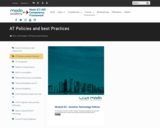
In this module we will provide a comprehensive description of the legal landscape of the assistive technology locally and on an international level as well as best practices.
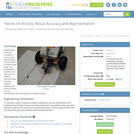
Students learn about the concepts of accuracy and approximation as they pertain to robotics, gain insight into experimental accuracy, and learn how and when to estimate values that they measure. Students also explore sources of error stemming from the robot setup and rounding numbers.

This video segment adapted from First Light explains why the highest peak in the Pacific, Mauna Kea, is an ideal site for astronomical observations. Featured are new telescope technologies that allow astronomers to explore the universe in more depth.

In this short module, you will learn about the importance of designing accessibility and how to ensure your documents are accessible to all. Not all people have the same degree of ability which is why it is important to consider when creating and sharing information with others. For instance, people with visual impairments and people with auditory impairments have to navigate documents differently than their able-bodied peers. This is why you should be thinking about how you can make your documents more accessible so that everyone can interact with it not just those who are able-bodied.

This article describes covert and overt active engagement strategies for use with elementary students. Find the Question templates are included for use with informational text.

Objetivo de Aprendizaje Conocer, entender y ajustar la estructura funcional de un centro de proceso de datos (CPD) para una empresa bancaria, con la finalidad de alinearla con las recomendaciones de ISO 27 000 para la gestión de la seguridad de la información.

Our brains control every movement we make. Most of us take for granted our ability to pick up a cup or change the television station. However, for people who have lost a limb or become paralyzed, the inability to do these things means a loss of freedom and independence. This video segment from Greater Boston describes how neuroscientists and bioengineers have teamed up to create a system that allows people who have lost motor functions to control electronic devices through their thoughts alone. Grades 6-12

Do you need proof that driving is a dangerous activity? More Americans have died in car crashes over the past 100 years than in all the wars the U.S. has ever fought combined. More than 40,000 Americans die each year on the nation's highways, most as the result of high-speed collisions. In this video segment adapted from NOVA, learn how engineers developed the air bag, an important automobile-safety device now found in most cars.
Recommended for: Grades 3-12

In this video segment adapted from ZOOM, cast members make their own hovercraft and demonstrate how the air leaking out of a balloon can make a plastic plate hover above a table.

Anila Quayyum Agha’s installation Alhambra Nights was selected to be included in the City of Cincinnati’s BLINK festival. The event spanned twenty city blocks and included light, interactive art, and large-scale projection mapping. Inspired by Agha’s visit to the Alhambra and her efforts to connect traditional Islamic art and architecture with contemporary technology and Western audiences.
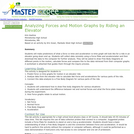
This activity is an indoor lab where students will make predictions of what a force vs time and acceleration vs time graph will look like for a ride in an elevator going down and up. Students will collect data remotely using a Force Plate and accelerometer and then download the data to the computer for further analysis.
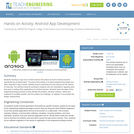
Students develop an app for an Android device that utilizes its built-in internal sensors, specifically the accelerometer. The goal of this activity is to teach programming design and skills using MIT's App Inventor software (free to download from the Internet) as the vehicle for learning. The activity should be exciting for students who are interested in applying what they learn to writing other applications for Android devices. Students learn the steps of the engineering design process as they identify the problem, develop solutions, select and implement a possible solution, test the solution and redesign, as needed, to accomplish the design requirements.
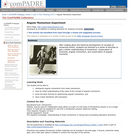
After using the historical development of concepts of conserved motion to develop introductory understanding, students are directed to a series of activities to gain a better understanding of momentum, conservation of momenta, angular momentum, and conservation of angular momenta.
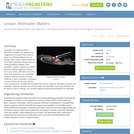
Antimatter, the charge reversed equivalent of matter, has captured the imaginations of science fiction fans for years as a perfectly efficient form of energy. While normal matter consists of atoms with negatively charged electrons orbiting positively charged nuclei, antimatter consists of positively charged positrons orbiting negatively charged anti-nuclei. When antimatter and matter meet, both substances are annihilated, creating massive amounts of energy. Instances in which antimatter is portrayed in science fiction stories (such as Star Trek) are examined, including their purposes (fuel source, weapons, alternate universes) and properties. Students compare and contrast matter and antimatter, learn how antimatter can be used as a form of energy, and consider potential engineering applications for antimatter.

This infograph gives us an overview of the basic materials made of various polymers required to build a spacecraft.
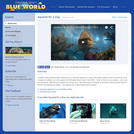
In this video Jonathan visits the New England Aquarium as a volunteer aquarist for a day to learn what it takes to care for thousands of fish in dozens of exhibits, up to the massive 200,000 gallon Giant Ocean Tank (GOT). What he finds is an eye openerŰÓitŰŞs not all fun and games. Maintaining an aquarium is serious work. But it does have its benefits, as Jonathan discovers while diving in the GOT and feeding the sharks. This segment won a New England Emmy Award! Please see the accompanying study guide for educational objectives and discussion points.

This video segment adapted from Building Big illustrates the strength of the arch in bridge design and construction.
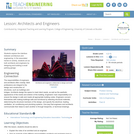
Students explore the interface between architecture and engineering. In the associated hands-on activity, students act as both architects and engineers by designing and building a small parking garage.

At first glance, Katena might look like an ordinary inflatable with an unusually complex and oversized structure. But when they walk inside, visitors soon realize this is an entirely different experience. They enter a world apart, a world of interconnecting tunnels and domes saturated with light and color, called a luminarium. This video will take your students on a virtual tour of one luminarium that was featured at the Cincinnati BLINK festival. They will learn how the design team of Architects of Air blends geometry, art, and architecture to create a pneumatic, or air-filled, structure in which form must follow function.